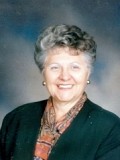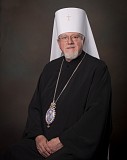FATHER ROMAN BRAGA – MEMORY ETERNAL
April 2, 1922 - April 28, 2015
By Dr. Dan Hinshaw
In the instructions that Fr. Roman gave regarding his death and funeral, he specifically stated that there should be no eulogies given. But as one of his many spiritual children who were so fond of hearing him offer a “word” at the end of Liturgy, I would like to humbly offer with love and deep gratitude my observations, as one of his physicians, in witness to the final word he offered us as he approached his death. Fr. Roman always encouraged us to think of prayer as a continual, ongoing conversation with God; nothing, no activity, no matter how seemingly trivial, falls outside of the Providence of God’s love and care for His creatures. And, so it has been during this long final leg of his journey toward the Kingdom. His living unto death has been one continual prayer. Always present, as a beacon guiding his path during these many months of decline and suffering, has been the precept so often stated by the spiritual father of his youth, Fr. Cleopa of Sihastria: “Patience, patience, patience!” He literally was a living icon of Christ’s admonition recorded in St. Luke’s gospel (21:19): “In patience possess your souls.”
In the same gospel (Luke 6:20), our Lord also states: “Blessed are you poor…” Fr. Roman, as a monastic had already voluntarily embraced holy poverty but in these last two years of his life, he was given the grace to experience the absolute poverty of the dying, a particularly slow kenosis, a complete self-emptying, like his Crucified Lord. There was no hesitation, no resistance or bargaining, only full acceptance of whatever would come with all the uncertainty and suffering. At the time of his 93rd birthday, just a few weeks before his death, he was asked, if the traditional birthday salutation, “Many Years,” should be sung. His response summed up the essence of the Orthodox Christian life: “No! I have finally begun to learn how to die.”
When politely asked how he was doing, he would frequently reply with a smile, “I’m waiting.” That simple phrase, “I’m waiting,” must be placed within the context of the faithful, disciplined commitment to his daily rule of prayer that sustained and enervated him through this long trial. Indeed, it is unlikely that he would have lived as long as he did, being literally eaten up by his illness, without the discipline of his prayer life. Not only did he live in continual conversation with God, he also placed this healing relationship within the communion and sacramental life of the Church. Armed with a habit of prayer, he could then face the gradual stripping away, first, of his ability to stand and serve as a priest at the altar, later, his ability to attend Liturgy in a wheelchair, and finally, even to rise from his bed to complete his daily rule of prayer. And yet, he continued to pray while lying immobile in bed the quintessential prayer of the Christian penitent, “Lord Jesus Christ, Son of God, have mercy on me, a sinner.” When speech finally deserted him, he still silently made the sign of the cross, for he had attained to silence, the language of Paradise.
In his constant concern for others and as the consummate teacher he was he would sometimes from the depths of his own struggles stop and teach us. There was no act, no small kindness that escaped his notice. Even when he appeared to be asleep from exhaustion or in deep prayer, he would always say, “Thank you,” at which his caregivers would always marvel but secretly cherish in gratitude. When he could no longer ambulate, rather than complain, he simply said, ““I can’t use my legs anymore, so I must rely more on God.” And in reference to the disruption of his long established monastic rule of prayer, he said, “I just can’t do it any longer. God must take over.” There is a real tedium to dying. Near the end of his long decline, Fr. Roman expressed this reality by saying, “Dying is so difficult.” But, he transcended the difficulty of dying by embodying the monastic discipline of cheerfully accepting the ultra mundane. He fought the boredom, the pain and frustration of his progressive disability by embracing small joys. None of us who witnessed his childlike pleasure when eating ice cream will ever think of this dessert again without remembering his saying that “monks are children with beards.”
It is an enormous grace of God to attend to the suffering of the dying, especially when that dying person radiates the love of God. It creates a yearning to follow the loved one all the way and yet each death is ultimately a solitary experience. Graciously, Fr. Roman allowed us to journey with him and become witnesses of his suffering through death unto real life. The paradox of suffering is that we not only suffer alone but also in community. Love bridges the gap. Thank God that this man who had suffered so much in his earlier life was surrounded by a community of love and healing at the end of his earthly sojourn.
Fr. Roman’s long slow decline over the past two years has been a type of the second half of the Divine Liturgy, the Liturgy of the Faithful, in which according to his own spiritual rhythm, his communion with God has been perfected in his suffering or in St. Paul’s words, God’s strength has been made perfect in his weakness. His spiritual health and his ultimate healing have been marked by his deep humility and devotion to the Eucharist in which he would proclaim, “I am not worthy to approach you Lord, but I cannot live without you.”
Fr. Roman once made the profound observation that “Suffering is the source of culture.” How we, as Christians, suffer can either elevate or diminish the essence or soul of our culture. So we look to the saints of old and those contemporary witnesses like Fr. Roman to serve as our models and guides as we face our own suffering.
Thank you Fr. Roman for teaching us until the very end. We ask for your continued prayers for all your spiritual children and for the entire Church.
Father Roman Braga: May his memory be eternal!
.
.


 Orthodoxy in America
Orthodoxy in America

 BOYAR, Dr. Stan
BOYAR, Dr. Stan


![Archimandrite Alexander [Pihach]](https://images.oca.org/in-memoriam/2016-1007-archim-alexander-pihach.jpg)
 .
.




